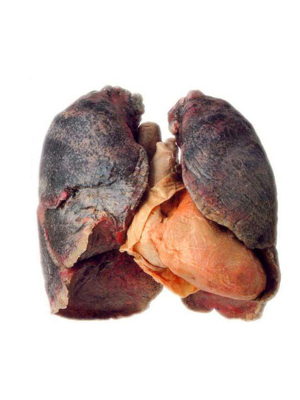Respiratory Diseases
1. Smoking
Smoking severely damages your health and contributes to thousands of deaths every year. Cigarettes contain lots of harmful chemicals and these cause damage to the lungs and the heart. See the table below for a list of the main toxic chemicals.
Toxic Chemicals contained in cigarettes and their effect
| Chemical | What it is | Long term effect on the body |
| Nicotine | Nicotine is a drug. It is highly addictive which is why smokers find it so difficult to give up. | |
| Tar | This is a brown and treacly substance. It collects in the lungs when the smoke cools. It contains thousands of chemicals some of which are carcinogens. | |
| Carbon monoxide | This is a poisonous gas. It is taken up by the blood instead of oxygen. | |
| Irritants and toxic substances | Chemicals |
Smoking and Disease
Smoking increases the risk of developing of other diseases. These range from fatal diseases to others that may not be fatal, but can cause years of suffering and unpleasant symptoms. Below are some of the main diseases associated with smoking.
| Lung cancer | Smoking is one of the biggest contributors to lung cancer. More than 8 in 10 cases are directly related to smoking. |
| Heart disease | About 1 in 7 of these deaths are due to smoking. |
| Other cancers | Of the mouth, nose, throat, larynx, oesophagus, pancreas, bladder, cervix, blood (leukaemia), and kidney are all more common in smokers. |
| Circulation | Chemicals in tobacco damage the lining of the blood vessels and affect the level of fat in the bloodstream. This increases the risk of atheroma forming (small fatty lumps). Atheroma is the main cause of heart disease and can also causes strokes. |
| Ageing | Causes ageing of the skin and wrinkles. |
| Fertility | This is reduced in smokers (both male and female). |
| Menopause | On average, women who smoke have a menopause nearly two years earlier than non-smokers. |
Smokers’ lungs
| Non Smoker | Smoker |
|---|---|
 |
 |
Passive smoking
Smoking is not only harmful to the smoker but can also have a detrimental effect on those around them. Inhaling other peoples' cigarette smoke is called passive smoking. Passive smoking affects people of all ages. It has been linked with the following health problems in:
Children and babies
- More prone to asthma
- More prone to ear, nose and chest infections
- Suffer from wheezing and chronic coughs
- Have an increased risk of dying from cot death
- Are more likely than average to become smokers themselves when older
- Are at an increased risk of developing cancer as adults
Adults
- Have an increased risk of lung cancer
- Have an increased risk of heart disease
- Can make asthma worse
- Causes irritation to the eyes, nose and throat
Smoking and pregnancy
Smoking is also extremely harmful during pregnancy and can lead to:
- Miscarriage
- Bleeding during pregnancy
- Premature birth
- Low birth weight (Premature and low birth weight babies are more prone to illness and infections.)
- Congenital defects in the baby
- Stillbirth or death within the first week of life
